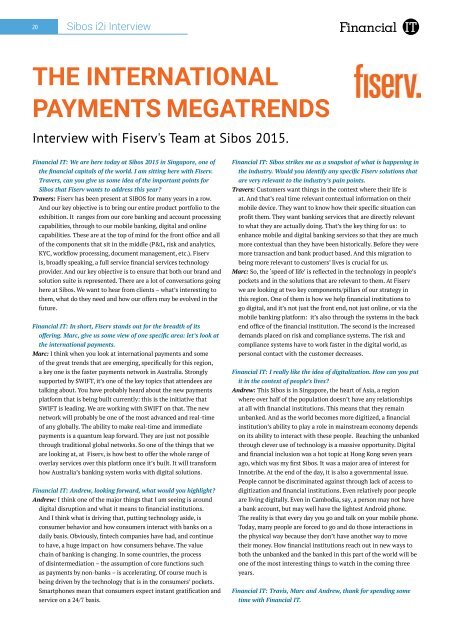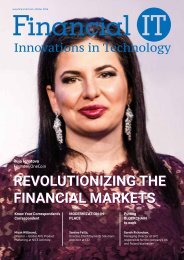Revolutionizing the Financial Markets
You also want an ePaper? Increase the reach of your titles
YUMPU automatically turns print PDFs into web optimized ePapers that Google loves.
20<br />
Sibos i2i Interview<br />
The International<br />
Payments Megatrends<br />
Interview with Fiserv's Team at Sibos 2015.<br />
<strong>Financial</strong> IT: We are here today at Sibos 2015 in Singapore, one of<br />
<strong>the</strong> financial capitals of <strong>the</strong> world. I am sitting here with Fiserv.<br />
Travers, can you give us some idea of <strong>the</strong> important points for<br />
Sibos that Fiserv wants to address this year?<br />
Travers: Fiserv has been present at SIBOS for many years in a row.<br />
And our key objective is to bring our entire product portfolio to <strong>the</strong><br />
exhibition. It ranges from our core banking and account processing<br />
capabilities, through to our mobile banking, digital and online<br />
capabilities. These are at <strong>the</strong> top of mind for <strong>the</strong> front office and all<br />
of <strong>the</strong> components that sit in <strong>the</strong> middle (P&L, risk and analytics,<br />
KYC, workflow processing, document management, etc.). Fiserv<br />
is, broadly speaking, a full service financial services technology<br />
provider. And our key objective is to ensure that both our brand and<br />
solution suite is represented. There are a lot of conversations going<br />
here at Sibos. We want to hear from clients – what’s interesting to<br />
<strong>the</strong>m, what do <strong>the</strong>y need and how our offers may be evolved in <strong>the</strong><br />
future.<br />
<strong>Financial</strong> IT: In short, Fiserv stands out for <strong>the</strong> breadth of its<br />
offering. Marc, give us some view of one specific area: let’s look at<br />
<strong>the</strong> international payments.<br />
Marc: I think when you look at international payments and some<br />
of <strong>the</strong> great trends that are emerging, specifically for this region,<br />
a key one is <strong>the</strong> faster payments network in Australia. Strongly<br />
supported by SWIFT, it’s one of <strong>the</strong> key topics that attendees are<br />
talking about. You have probably heard about <strong>the</strong> new payments<br />
platform that is being built currently: this is <strong>the</strong> initiative that<br />
SWIFT is leading. We are working with SWIFT on that. The new<br />
network will probably be one of <strong>the</strong> most advanced and real-time<br />
of any globally. The ability to make real-time and immediate<br />
payments is a quantum leap forward. They are just not possible<br />
through traditional global networks. So one of <strong>the</strong> things that we<br />
are looking at, at Fiserv, is how best to offer <strong>the</strong> whole range of<br />
overlay services over this platform once it’s built. It will transform<br />
how Australia’s banking system works with digital solutions.<br />
<strong>Financial</strong> IT: Andrew, looking forward, what would you highlight?<br />
Andrew: I think one of <strong>the</strong> major things that I am seeing is around<br />
digital disruption and what it means to financial institutions.<br />
And I think what is driving that, putting technology aside, is<br />
consumer behavior and how consumers interact with banks on a<br />
daily basis. Obviously, fintech companies have had, and continue<br />
to have, a huge impact on how consumers behave. The value<br />
chain of banking is changing. In some countries, <strong>the</strong> process<br />
of disintermediation – <strong>the</strong> assumption of core functions such<br />
as payments by non-banks – is accelerating. Of course much is<br />
being driven by <strong>the</strong> technology that is in <strong>the</strong> consumers’ pockets.<br />
Smartphones mean that consumers expect instant gratification and<br />
service on a 24/7 basis.<br />
<strong>Financial</strong> IT: Sibos strikes me as a snapshot of what is happening in<br />
<strong>the</strong> industry. Would you identify any specific Fiserv solutions that<br />
are very relevant to <strong>the</strong> industry’s pain points.<br />
Travers: Customers want things in <strong>the</strong> context where <strong>the</strong>ir life is<br />
at. And that’s real time relevant contextual information on <strong>the</strong>ir<br />
mobile device. They want to know how <strong>the</strong>ir specific situation can<br />
profit <strong>the</strong>m. They want banking services that are directly relevant<br />
to what <strong>the</strong>y are actually doing. That’s <strong>the</strong> key thing for us: to<br />
enhance mobile and digital banking services so that <strong>the</strong>y are much<br />
more contextual than <strong>the</strong>y have been historically. Before <strong>the</strong>y were<br />
more transaction and bank product based. And this migration to<br />
being more relevant to customers’ lives is crucial for us.<br />
Marc: So, <strong>the</strong> ‘speed of life’ is reflected in <strong>the</strong> technology in people’s<br />
pockets and in <strong>the</strong> solutions that are relevant to <strong>the</strong>m. At Fiserv<br />
we are looking at two key components/pillars of our strategy in<br />
this region. One of <strong>the</strong>m is how we help financial institutions to<br />
go digital, and it’s not just <strong>the</strong> front end, not just online, or via <strong>the</strong><br />
mobile banking platform: it’s also through <strong>the</strong> systems in <strong>the</strong> back<br />
end office of <strong>the</strong> financial institution. The second is <strong>the</strong> increased<br />
demands placed on risk and compliance systems. The risk and<br />
compliance systems have to work faster in <strong>the</strong> digital world, as<br />
personal contact with <strong>the</strong> customer decreases.<br />
<strong>Financial</strong> IT: I really like <strong>the</strong> idea of digitalization. How can you put<br />
it in <strong>the</strong> context of people’s lives?<br />
Andrew: This Sibos is in Singapore, <strong>the</strong> heart of Asia, a region<br />
where over half of <strong>the</strong> population doesn’t have any relationships<br />
at all with financial institutions. This means that <strong>the</strong>y remain<br />
unbanked. And as <strong>the</strong> world becomes more digitized, a financial<br />
institution’s ability to play a role in mainstream economy depends<br />
on its ability to interact with <strong>the</strong>se people. Reaching <strong>the</strong> unbanked<br />
through clever use of technology is a massive opportunity. Digital<br />
and financial inclusion was a hot topic at Hong Kong seven years<br />
ago, which was my first Sibos. It was a major area of interest for<br />
Innotribe. At <strong>the</strong> end of <strong>the</strong> day, it is also a governmental issue.<br />
People cannot be discriminated against through lack of access to<br />
digitization and financial institutions. Even relatively poor people<br />
are living digitally. Even in Cambodia, say, a person may not have<br />
a bank account, but may well have <strong>the</strong> lightest Android phone.<br />
The reality is that every day you go and talk on your mobile phone.<br />
Today, many people are forced to go and do those interactions in<br />
<strong>the</strong> physical way because <strong>the</strong>y don’t have ano<strong>the</strong>r way to move<br />
<strong>the</strong>ir money. How financial institutions reach out in new ways to<br />
both <strong>the</strong> unbanked and <strong>the</strong> banked in this part of <strong>the</strong> world will be<br />
one of <strong>the</strong> most interesting things to watch in <strong>the</strong> coming three<br />
years.<br />
<strong>Financial</strong> IT: Travis, Marc and Andrew, thank for spending some<br />
time with <strong>Financial</strong> IT.







